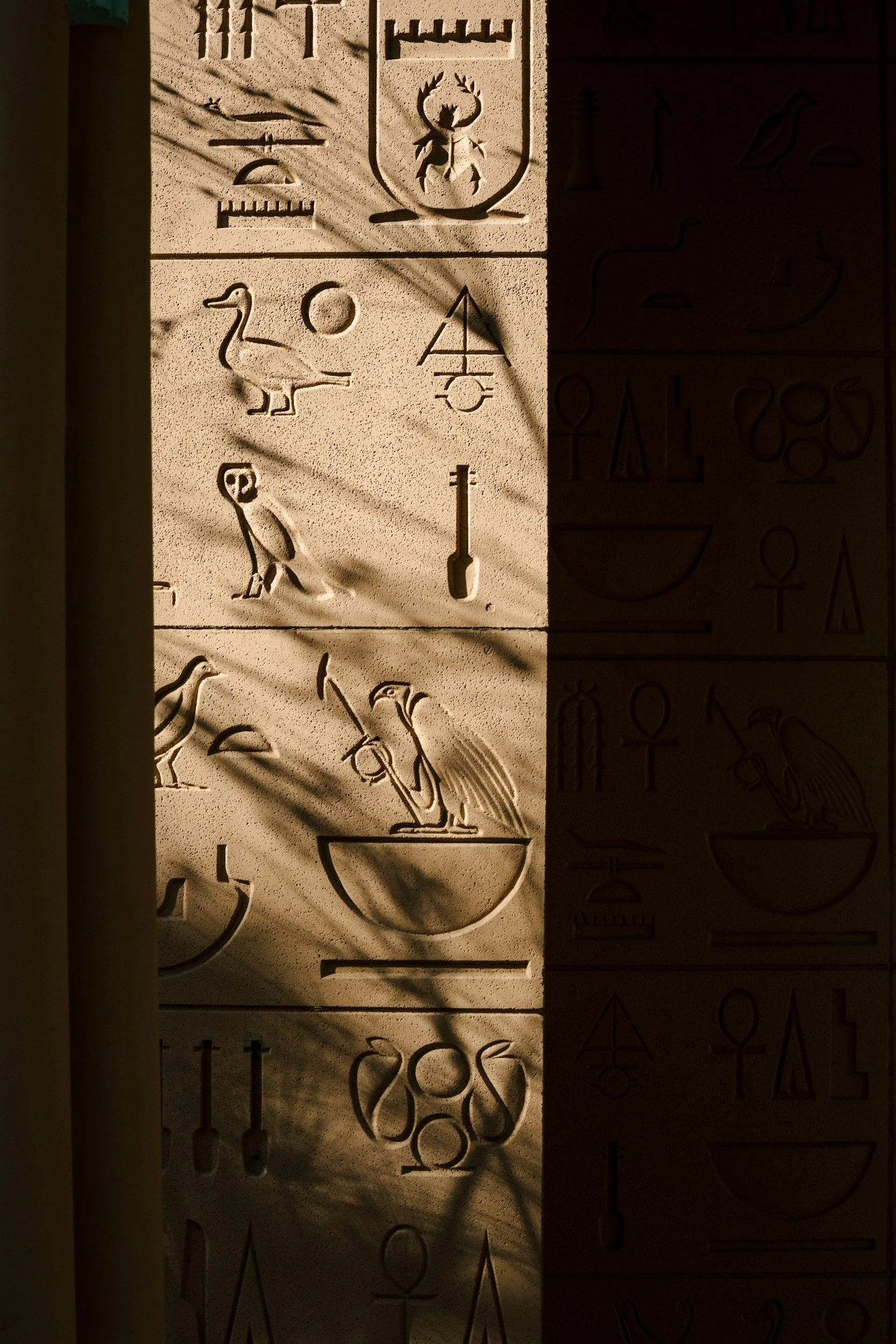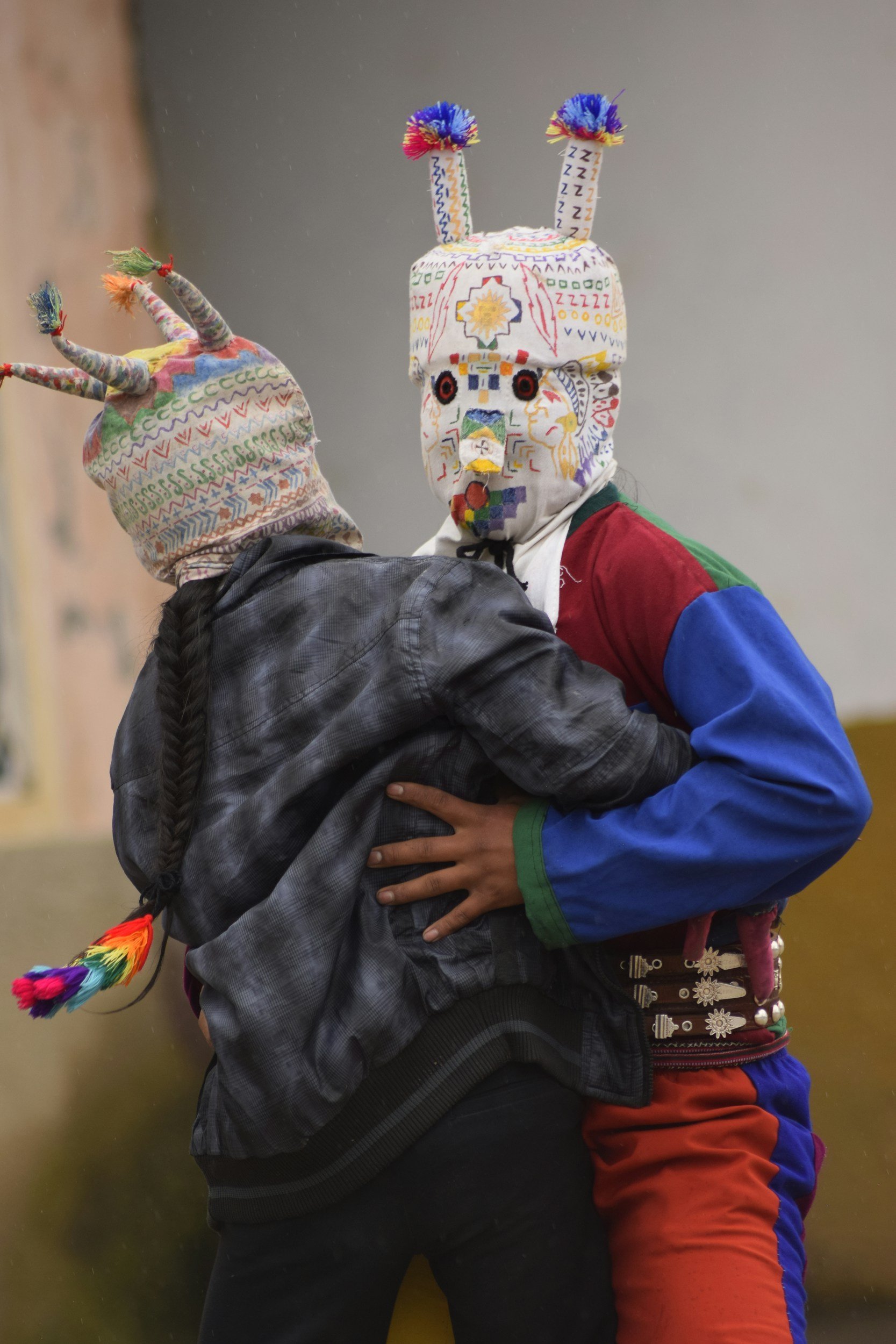Ekwensu! The Mighty Agbara of Wealth & War in Igbo Spirituality
A Compilation of Notes on Ekwensu in Igbo Cosmology
“Ekwensu is the Beautiful one in Igboland and in ancient Egypt. It is a war god with countless victories as Oha Obala/Ora Obala. In Igbo Afa, it is saluted as: Ekwensu Ugo tugbulu agwo, i.e., Ekwensu, Eagle that pecked the evil serpent to death. As Ekwensu Ugo it is also the beautiful one as the Eagle is greeted and invoked in Igbo mysticism as: Ugo Oma, Egbe na-elu n’énu, Ugo na-elu n’ana - The Beautiful Eagle, The Kite glides up the sky, While the Eagle glides down the land. From the above, the reference to Khonsu or Khensu as hawk-headed man should be corrected to mean Eagle-headed deity. What the above poetic invocation by the Igbo Dibia is really saying is that while Agwu, the Kite-headed Holy Spirit glides up the sky, Ekwensu the Eagle spirit of war and victory glides down the earth with its countless war exploits and victories. Ekwensu is also confirmed to be one of the benevolent lunar deities. The Igbo Afa terminology Ora Obala/Oha Obala literally means Child of the God of Light or Child of the Sun means the Moon, the Eagle, and Ekwensu. It is indeed a ridiculous absurdity for any Igbo person to talk of Ekwensu as a devil or an evil spirit as the Eagle and the Moon and the Child of Light have never been associated with evils or evil ones but have always been associated with: achievement, good, victory, success and the beautiful ones.” - John Anenechukwu Umeh, After God Is Dibia
“Ekwensu bu Ikenga Ushi. Ekwensu for I Am the Chi with a thousand names. “Obiaru Igbu m gbuo onwe ya” is the philosophy of Ekwensu, Ora Obala, Oha Obala, Ubala, Ugo Tubulu Agwo. Ekwensu / Eshu / Eshi / Esu / Egbesu, Ekwenshi / Ekwe Ushi, is the Christ of the Lunar culture, Thousands of years before the Solar cullture. Ekwensu is not the devil. The Devil (Ajo Mmuo) is your ability to do evil. Ajo-Mmuo is a force that creates wickednesss, it really has nothing to do with Ekwensu. Ekwensu is Oke-Agwu / Eze-Agwu, it is The Master Teacher, The Pathfinder, The Warrior. It is a spirit that gives you wisdom in difficult times. In Igbo cosmology, Ekwensu is also known as the Victorious Eagle. It is a spirit that our ancestors channel during the time of war. Thus Ekwensu is also the Chi of war. The zoomorphic form of Ekwensu is the Eagle known as Ugo in Igbo. The Eagle is a predator that preys on predators. Before Osiris / Ausar was born, there was Khensu. The Son of Amen and Mut. In Igbo, Khensu is Ekwensu or Nkwo-Nshi - The Falcon Hawk of the Divine Ancestors. Nkwo is the Falcon/Hawk, which is the zoomorphic form of Khonsu.” - UGOEBENAJA, The Age Of Aquarius Is The Age Of EKWENSU (2022)
“Purification rites so offered to Ekwensu demonstrate both the character of the deity and symbols used in the purification rites. To kill an enemy in a war is an act of bravery and an achievement. However, it also brings a state of pollution on the killer. So, as soon as a warrior comes back with the head of the enemy, he must take it to the priest of Ekwensu, (together with a chicken), who lays it in front of the carved image of the spirit. The priest then pours some medicine extracted from the Akoro leaves (a creeping plant) over the warrior's hands saying: "You are washing off the evil." He then pours a libation over the skull, saying, "Let not your ghost worry this man who killed you. He is not the first man to begin the thing he did." He then addresses Ekwensu, as follows: "This man went somewhere and returned with a head. He is not the first or second to do so. He followed the ancient practice permitted by Chukwu and Ala. Do not kill him therefore and do not permit the ghost of the man to pursue him". The priest finally shaves the head-getter's hair. A public dance follows in which the new head-getter joins with other head-getters.” - Emefie Ikenga-Metuh, Ritual Dirt and Purification Rites among the Igbo. Journal of Religion in Africa, Vol. 15, Fasc. 1 (1985)
“[…] Ekwensu was a deity of violence in Igbo land before it was hijacked to translate the Christian devil. The Igbo cosmological concept of Ekwensu was far different from the Christian concepts that regard him as arch-opposer of God and [mastermind] of evil. Metuh […] explains, “A person given to violence is said to be possessed by Ekwensu! Since violence can spell disaster for the community during peace time, the activities of Ekwensu herald misfortune, […] However, at wartime, his activities are propitious and he is invoked as a good spirit. Warriors set up shrines where they make sacrifices to Ekwensu.” Arazu […] [maintains] that Ekwensu was one of the gods worshipped in the traditional society and some areas bore the name Umu Ekwensu and even celebrated the feast of Ekwensu before the advent of Christianity. [...] Christianity [...] has inherently transformed the initial meaning to the new Christian view point. [...] This ontological transition or change over from earlier cosmological view about Ekwensu has not only ushered in new socio-cultural conditions but also has distorted the psyche of many Igbo by turning them into “demon-maniacs”, a condition that was not there before, that is seeing Satan and his demons every where. [...] Today Ekwensu (the devil) is a malevolent, dangerous and wicked spirit with his numerous demons that are responsible for all evils, misfortunes and wickedness in the new Igbo Christianized world-view.”- Edwin Udoye (2011). pp. 104–105.
“In Igbo spirituality we do not have the concept of the devil. The entity or the energy called Ekwensu is not the devil. It’s a concept that has just been turned on it’s head and utilized by Christianity. No, Ekwensu is not devil. Now the Igbos do recognize that there are evil spirits but they’re not Ekwensu. Evil spirits they’re myriad. You have Ndi Ogbo na Uke, peers who have crossed over and are causing confusion. You have Ogbo di na Ana, abomination that occurred ages ago creating trouble. You have people between the planes, they haven’t really crossed over, they’re stuck between the earth plane and the astral, and in frustration they’re acting out against people on earth. The list is endless and it also tells you that you can defeat all those demons rather than something to be feared. You have dominion to fight against such things wreaking havoc in your life or wreaking havoc around, however Ekwensu is not devil. Ekwensu is the beautiful eagle that pecked the evil snake to death. It is a god of war which has achieved countless victories, that is what Ekwensu is.” - Nnaedozie Umeh, Igbo Spirituality in Contemporary Nigeria (Igbo Conference)
“...‘Ekwensu’ the most feared and spurned by the Christians as the most dreadful of the wicked spirits, is regarded by the pagans as the most faithful companion of his worshippers. His feast is celebrated with great pomp and pageantry by the adherents. Whenever the feast is being celebrated, men, women and children are all in a festive mood; and the day is declared free and sacred, and no work is to be done. This feast is known as ‘Nta’ or ‘Onu ugboguru’ by some communities, or ‘Uhie ji oku’ by others. Other community gods whose feasts are warmly observed include ‘Ochichi’, ‘Urasi’, ‘Duruji’ and ‘Ogwugwu’.” - Jonathan G. Okoro, The Nigerian child and the crises in his education (2000)
“Ekwensu, who is the trickster and bargaining god in Igbo cosmology. Contrary to popular opinion that stems from religious beliefs, Ekwensu is not the devil. Apparently, with the invasion that brought Christianity to Nigeria, many of the cultures and customs were not understood by these strangers trying to navigate this new terrain. In a bid to juxtapose the culture and traditions of the people placed beside theirs (missionaries), the idealized concept of Ekwensu referred to as the devil began to take root. This misleading notion has thus festered, making Ekwensu lose its original identity. Just like Norse mythology that has Loki as the contriver of fraud and who does not fall short of it, among the Igbo gods (Alusi) like Ani, Chukwu, and Igwe, Ekwensu is the god who plays such roles. In Igbo spirituality, the concept of the devil does not exist and so Ekwensu is the god that also brings victory to the people, winning wars and thus seen as the God of war. Ekwensu is crafty when it comes to trade and negotiations and is often petitioned for guidance in difficult money-oriented situations. He is perceived as a spirit of violence that incites people to perform violent acts. But with Ekwensu and every other trickster embedded in the mythology of varying cultures around the world, there is no grey area.” - Chinelo Eze, The Trickster Gods Around The World (2022)
“ “Ekwe” we know could be a wooden gong; could be an affirmation as in “we agree” but the “nsu” term just floored us. Does “nsu” have ties with “esu” as in ogu esu (fight breaks out) so that one can say that “ekwensu” literally means a wooden gong that announces war or generally that announces a bad thing… I reasoned that “ekwensu” could be a corruption of “ekwensi” a phrase which means, “not capable of being poisoned,” or “refusing to be poisoned,” but that did not seem to jive with the religious underpinnings of “ekwensu.” I discarded that theory. Next I theorized that “ekwensu” could be a corruption of “ekwenshi” but ekwenshi had no philophical bearing as far as I could tell. Somehow, though, I figured out that if I could find out the meaning of “nshi” in Igbo language, I could in fact crack the riddle of the “ekwensu” phrase….“nshi” probably referred in ancient Igbo to autochthons, little heaven beings, spirits of the earth who acted with one mind. “Ekwenshi” or what is known today as “ekwensu” therefore probably refers to a rebellious character who did not agree with the autochthons.” - Dr. Aniedobe (2013)
“A similar occurrence is observable in the identity of the Igbo god of War in Aguleri tradition, which is called Ekwensu. He is a savior god, who steps in to defend the people in troubled times. We are inclined to merge the Aguleri god of war, Ekwensu, with the Eddas warlord Muklu/Michael. By an accident of faith Ekwensu’s name was used by the Christian missionaries as the translation for the English word ‘Devil’ or ‘Satan’. Thus was an Igbo savior god, robbed of his ‘savior status’ to become the English equivalent of Satan and Evil. In Ekwensu – A Heroic Deity or Christian Devil, Prof Damian Opata of the English Department, UNN demonstrated that Ekwensu is a name for the god Urashi in Obodo Ukwu, Ideato North LGA, Imo State and that he is also an Nsukka smith-god apart from being a war-lord and the ancestor of several clans of Ndi Igbo in Igbo land: “Ekwensu is the god that repels or wards off evil designs,” which is why Igbos run to him when in trouble. “Not finding the equivalent of the concept of Satan in the host society, the Christian missionaries adopted the name of this “anti-evil deity but reversed its semantics.” - Catherine Obianuju Acholonu, “Eden in Sumer on the Niger.”
"In Afa Akpukpara Ogiri, Ekwensu was seen as ORA UBALA, or OHA UBARA, literal meaning UGO. He was hailed as UGO TUGBULU AGWO / The Victorious Eagle that conquers snakes. And if you look into nature, you will often find the Eagle conquering snakes. Thus the key to African victory is in the mysteries of EKWENSU. And Igbo people and African people will never be free on this planet, until they abandon Abrahamism and accept EKWENSU as their personal Lord and savior that dwells within them.” - UGOEBENAJA
“EKWENSU is the victorious eagle of the Igbo people.” - SIRIUS UGO ART (UGOEBENAJA)
“Ekwensu: Ekwensu is not the devil but an Arusi. Its role differs among different Igbo groups. However, it is generally regarded as a spirit of violence by most Igbo as it incites people to violence. This can be very useful during wars and Ekwensu is therefore invoked by warriors and head-hunters. But Ekwensu may also incite people to violence during peacetime and the results may be disastrous. A person who acts recklessly is asked Ekwensu ona-akpa gi? 'Are you possessed by Ekwensu?'. Violent deaths are called Onwu Ekwensu. At the funeral ceremonies of warriors, their surviving comrades are supposed to do deeds of daring. They sometimes run around singing, ‘Onwe nwa kporu nwa ya, na Ekwensu abam n'anya’, ‘whoever has a child let him take him away, because I am now possessed by Ekwensu.’ In many parts of Igboland, especially on the western side of the Niger, there is an annual festival in honour of Ekwensu called Igba Oso Ekwensu, 'running for Ekwensu.' Warriors and all who have taken the title of Ogbu Mmadu, Man killer, parade the town glorying in their valour and singing the praises of Ekwensu. Paradoxically, the rituals include purification rites and rites for driving away Ekwensu, since its activities during peacetime would spell disaster for the community.” - Emmanuel Meziemadu Okoye, The traditional religion and its encounter with Christianity in Achebe's novels (1987)
“Satan and his Host constitute the Cosmic Judiciary and Armed Forces. They are the keepers of the Book of Life. The spirits of this hierarchy are responsible for Cosmic Order and the application of incurred Karma. The spirits of vengeance belong to this hierarchy. The Devil or Satan is Ekwensu in Igbo. A smart Igbo philologist gave the following analysis of Ekwensu: Ekwensu = E kwe n su = E kwe m su = E kwe o su = E kwe ya e-su. Let us consider the key terms in the name: (1) “E” is the Igbo impersonal subject marker, e.g., E delü = One wrote. E meligo fa = An unspecified subject has defeated them. (2) “Kwe” is the Igbo verb “to agree”, e.g., Kwe na ï ga-eme ya = Agree that you will do it. (3) “Su” is the verb “to begin suddenly” “to break out”, usually a commotion, e.g., Agha e-su = War breaks out. The name Ekwensu, therefore, means: If one agrees (E kwe), then something breaks out (ya e-su). The Laws are there and they are equally applicable to all. If you decide to break a law, then you have agreed to the commotion that breaks out inexorably. Ignorance of the law does not annul the consequences that accrue from its violation.” - Emmanuel Kaanaenechukwu ANIZOBA (EZEANA, ABÖSHÏ-UDUGHUDU-NGAGWU-DÏ-IGBO-EGWU)
‘If you really look at the emblem of the “Ogwu Ego” known as Ibobo, you will see the Isi Atu—goat or ram or buffalo head with the horns, then connect the dots with how that kind of horned animal head with its tapered spiral horns is an ancient totem which has everything to do with Ekwensu energy. Then go ahead and look at the ancient history of both energies—Ibobo and Ekwensu (their reputation for warfare & community welfare), you’ll realize that Ekwensu is just the colloquial name for Ibobo and vice versa. It is the same energy disguising.’ - Oma Ikenga
‘Ekwensu is revered as the god of war because it is equally the god of purification. It is okala mmadu okala mmuo, the one that can go beyond humans and beyond gods, both humans and gods have to come to this force to be cleansed each time they exceed their own boundaries.’ - Oma Ikenga
“Ekwensu is not Devil but a god, the god of War, one of the numerous worshipped god in the Igbo area. He stands in the rank with the likes of Ani, Amadioha, Ikéngà etc. He is regarded as the Igbo trickster god. I remember Nnamani Ifeoma explaining this at the Center for Memories. In most places na ala Igbo, Ekwensu maybe used a praise name of someone who has made a great accomplishment. The origin of the mistranslation of the term can be traced to differences between christianity and the traditional Igbo religion. In the Igbo view, there's no concept of the great god force as against the great evil forces, as exists in christianity. Therefore, in Igbo, there's no Devil, no heaven or hell, no demon or angels. There are just gods possesing varying degree of power, spirit whose nature was good or bad, as in the human case; and after life operated much in the same way as the physical world. Then came the colonial missionaries, who in their erroneous belief claimed that any religion strange to theirs was evil, and in the resultant quest for conversation, which latter faced with task of introducing these alien concept into the indigenous people's belief to do this, they copied methods of early christianity in Roman empire, who absorbed pegan festivals and rituals. By using existing indigenous concepts that had an infinitesimal likeness to theirs and distorts them to fit the mold of the concept they were trying to get across. In other words, they improvised. So, chi,the personal guiding force or chukwu, the Aro deity became the supreme God. And Ekwensu came in as the devil, to complete the spiritual binary of the christian faith, thus began the journey of demonizing Ekwensu, seeminly beyond repair. The story of Ekwensu is another tastament to damage colonialism wrought on the cultures of the African continent. Yet the demage is not entirely without salvagebility.” - Chude Nnamdi (Ekwensu In Igbo Cosmology)
“Anytime You Use The Name EKWENSU As A Form Of Evil, You Cursed The Liberating Spirit That Dwells Within You. The Colonizers Brainwashed Ndi Nkiti To Use Their Mouth And Curse The Liberating Spirit That Dwells Within Them. EKWENSU BU EZE ENU (The Priest-King Of The Sky). EKWENSU BU ORA-OBALA In Afa... That Is UGO. As The Greatest Warrior In Igbo Pantheon, EKWENSU BU UGO TUGBULU AGWO, Thus Revealing His Zoomorphic Form To Be The Eagle. EKWENSU BU EZE ONWA (The Priest-King Of The Moon). The Teaching And Healing Spirit Of EKWENSU Is OKE_AGWU. EKWENSU Is The Savior Of The People. It Is He That They Plagiarized As Angel Michael, And Not The Devil Itself. EKWENSU Is An IGBO Savior Spirit, Robbed Of His Savior Status By Ndi Nkiti. And Ever Since Then, The Blackman Never Regained Consciousness.” - SIRIUS-UGO-ART
“Ekwensu was a popular deity Ekwensu worshipped by the Igbo people. In fact, there is a town known as Obi Ekwensu which is located northwest of Umu Akwa, south of Ovu Ngwu and southeast of Amapunta town in Isiala Ngwa South Local Government Area of Abia State. There is also a long, steep and tortuous hill in Ukpor, Nnewi South LGA known as Ugwu Ekwensu. Ekwensu is an Trickster deity of the Igbo people who serve as the Alusi or God of Bargain and the tortoise. Crafty at trade and negotiations, Ekwensu is often invoked for guidance in difficult mercantile situations. Like most Trickster Gods, the deity was a force of Chaos and Change, thus in his more violent aspects, Ekwensu was also revered as a God of War and Victory who ruled over the wicked spirits and the chaotic forces of nature. Ekwensu's companion was Death. With the advent of Christianity, the more beneficent aspects of the deity were supplanted by missionaries who came to misrepresent Ekwensu as Satan. Ekwensu's symbol is a tortoise. Recall that tortoise also symbolizes craftiness in Igbo folklore. It is noteworthy that it was during the colonial enslavement and during missionary period that Ekwensu was transcribed to become the Igbo word for Satan. Ekwensu has a co-ordinate power as Ogwugwu, Ulasi, Udo, Edo, Agbala, Amadioha etc. All are under the command of Chineke.” - Anayo Nwosu, A Powerful Igbo God Known As Ekwensu (2017)
“What then is the African/Igbo conception of Ekwensu in Igbo traditional thought is that ontological mysterious Violent force which when aggravated or invoked could be effectively used either for good or destruction. Every divinity or deity, disembodied dead human beings, ordinary living human beings have this element of mysterious violent force within them. When this violent force is used for redressing wrongs or punishing a malicious offender or false oath swearer, the Ekwensu in the particular agent becomes a good force. But when it is arbitrarily used for destroying people indiscriminately or damaging their property and even affecting their health, the Ekwensu becomes a destructive violent force.” - Anthony N.O. Ekwunife
“Like every other deity/god in Igbo Traditional Religion, Ekwensu is a component part of the integral Igbo Cosmo-religious universe, it does not oppose any deity; neither Chukwu, nor Ezechitoke nor Obinigwe. There is no hell fire known to the Igbo before the Christian era, therefore there was none for Ekwensu to operate. If God allowed for these deities to be essential parts of administering the world as many African scholars aver, then Ekwensu is just one of them like are Ogwugwu, Ofufe, Aro, Ngene, Aro bi n’agu, Udo, Agwu and so on. These deities/gods, forces/energies, like Ekwensu, were made for the enhancement of human life. Their primary essence is to see to it that human beings live the best life can afford within territories where they are born and live. The work fosters the opinion that the Christian Devil has no equivalent in the Igbo lexicon of deities/gods. Ekwensu is therefore one of those mistranslations perpetrated by Christianity by which its true nature and character has almost been lost.” - Chika JB Gabriel Okpalike & Christian Emeka Chukwu
“For an outsider the dual and complementary role of ekwensu may seem meaningless but not for the traditional Igbo people, this complementary dualistic conception has implications at the cosmological level of Igbo thought with this perception, good and bad are seen as co-existing in the same realities, creativity and destructiveness may be achieved by the same agencies.” - Ekwunife, A. N. O. (1995), Spiritual Explosions: Reflection on Christian lives and practices in Nigeria context.Enugu: SNAAP
“The name Ekwensu in Igbo cosmology generally denotes a negative perception. In this case, Ekwensu Adoro has an important role to occupy in the worship of the deity and in the life of the people. This shrine is located at Adoro forest. The major purpose or function was protection both in the positive and negative dimensions. When a person performs a marvelous act, he or she will visit the Onu Ekwensu to identify with the divinity or show appreciation. Negatively, when an individual commits a spectacular act such as murder, he or she escapes to Ekwensu Shrine where nobody can attack him.” - Azubuike Ezeugwu explaining the roles of Ekwensu-Adoro (2011)
Cool proverbs & axioms to ponder on:
Ekwensu, Ugo tugbulu agwo - Ekwensu, the Eagle that pecked the evil serpent.
Ewensu na ra ajo mmuo ike - May Ekwensu take away the strength of evil spirits.
Ewensu Awolo Mmuo! - Ekwensu the mysterious leopard of the spirit realm, the mystical shapeshifter.











